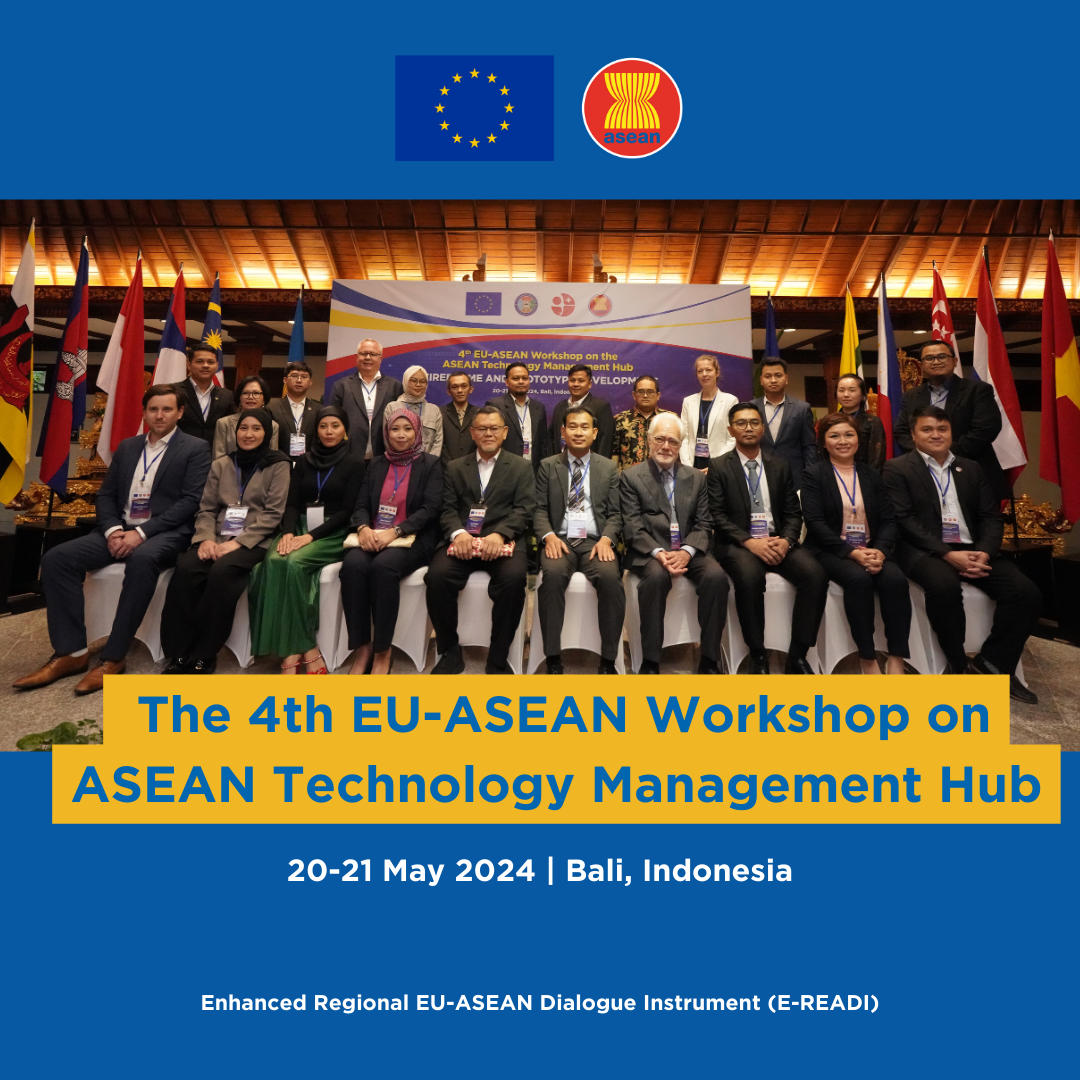
Pursuit of Innovation: EU, ASEAN advance in the design of region’s Technology Management Hub
Bali, Indonesia – At the 4th EU-ASEAN Workshop on the ASEAN Technology Management Hub (ASEAN TMH), 30 stakeholders, in person and online, joined hands to advance the development of ASEAN TMH – a mechanism to facilitate a regional technology and innovation ecosystem. This marked a pivotal milestone in the pursuit of innovation management across Southeast Asia.
Organised in collaboration with the ASEAN Committee of Science, Technology, and Innovation (COSTI) Cambodia and Indonesia, and facilitated under the Enhanced Regional EU-ASEAN Dialogue Instrument (E-READI), the workshop convened on 20-21 May 2024, in Denpasar, Bali, Indonesia.
The gathering provided an invaluable platform for esteemed stakeholders to refine and validate the intricate features and functionalities of the ASEAN TMH, inclusive of wireframe, mock-up and prototype development. Throughout the meticulously conducted presentations by the E-READI European experts, participants engaged in focus group discussion vital to addressing fundamental aspects of the project including business processes, intellectual property (IP) regulations and the long-term financial viability of the ASEAN TMH.
“The successful culmination of the 4th EU-ASEAN Workshop on the ASEAN Technology Management Hub reflects our collective commitment to fostering innovation and facilitating technology transfer within Southeast Asia,” remarked Dr Dudi Hidayat as the Board of Adviser to COSTI Member of Indonesia, representing COSTI Indonesia Chairperson. “The substantive exchanges and collaborative efforts in science, technology & innovation witnessed during the workshop signal a resolute stride forward in propelling economic growth and societal advancement throughout our region,” added H.E. Dr Seingheng Hul, Chairperson of COSTI Cambodia and ASEAN.
Noteworthy outcomes stemming from the workshop encompass the conceptualisation and refinement of a comprehensive wireframe and prototype for the ASEAN TMH platform, alongside the formulation of robust and sustainable business processes. The joint endeavour of stakeholders spanning academia, the private sector, governmental entities, and civil society has long been key in shaping the trajectory of technology management and innovation across the region.
“The primary objective of this workshop is clear and vital to the success of the ASEAN TMH – to further refine the TMH Proof of Concept, which will be reported at the upcoming COSTI-85 meeting in Siem Reap, Cambodia, taking place 2 weeks from now,” expressed Dr Zurina Moktar, Head of Science and Technology Division, ASEAN Secretariat. “By synergising the collective expertise and resources of both the EU and ASEAN member states, we are steadfastly forging pathways for technology-driven growth and addressing the prevailing challenges confronting the region,” concluded Thibaut Portevin, Head of Cooperation at the Delegation of the European Union to ASEAN.
At the workshop, stakeholders reaffirmed their strong commitment to further refining and operationalising the ASEAN TMH platform, with an unwavering focus on maximising its catalytic impact on research, innovation, and technology transfer across Southeast Asia.
The Association of Southeast Asian Nations (ASEAN) was established on 8 August 1967. The Member States of the Association are Brunei Darussalam, Cambodia, Indonesia, Lao PDR, Malaysia, Myanmar, Philippines, Singapore, Thailand and Viet Nam. On 31 December 2015, the ASEAN Community was formally established. The ASEAN Secretariat is based in Jakarta.
About the European Union (EU)
The European Union (EU) is the economic and political union of 27 Member States. Together, the EU has built a zone of stability, democracy and sustainable development while maintaining cultural diversity, tolerance and individual freedom. In 2012, the EU was awarded the Nobel Peace Prize for advancing the goals of peace, reconciliation, democracy and human rights in Europe. The EU is the world’s largest trading bloc, and the world’s largest source and destination of foreign direct investment. Collectively, the EU and its Member States are the largest donors of Official Development Assistance (ODA), providing more than half of ODA globally.
The 27 Member States of the EU (in protocol order) are: Belgium, Bulgaria, Czech Republic, Denmark, Germany, Estonia, Ireland, Greece, Spain, France, Croatia, Italy, Cyprus, Latvia, Lithuania, Luxembourg, Hungary, Malta, Netherlands, Austria, Poland, Portugal, Romania, Slovenia, Slovakia, Finland and Sweden.
For more information about the EU and its relations and cooperation with ASEAN, access http://eeas.europa.eu/asean and follow the Twitter, Facebook, Instagram and Youtube accounts.
